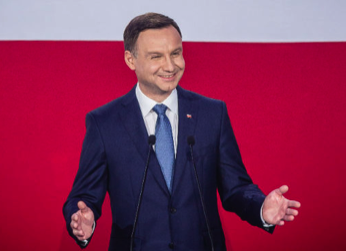24 May. Polish President Bronislaw Komorowski conceded defeat in Sunday’s presidential elections. The exit polls showed him trailing his main challenger, Andrzej Duda, who managed to win 53% of the votes. The State Electoral Commission is expected to announce the official results later today.
Duda’s victory comes as a surprise since Komorowski had initially been seen as a shoo-in for another term in office. That certainty waned after Duda’s startling 34.8% in the first round of voting, over Komorowki’s 32.2%. But there was always the expectation that the outgoing President would recover just enough to hold on to power for another five-year term.
The result marks a significant blow to the ruling Civic Platform and to its leader and Prime Minister, Ewa Kopacz. Ripple effects of Sunday’s vote are expected to be felt in the more important parliamentary elections due later this year. The Civic Platform, which backed Komorowski, up to now relies on a stable parliamentary majority, which will be jeopardized if voter discontent spills over to the October general elections.
Ripple effects of Sunday’s vote are expected to be felt in the more important parliamentary elections due later this year.
The outcome of the presidential elections is all the more remarkable as both the Civic Platform and President Kmorowski enjoyed relative popularity. The duo is considered to have led the country through a period of unprecedented economic growth, despite the financial crisis that engulfed much of the continent. Yet the vote on Sunday spoke of a different reality. Frustration over a widening income gap and increasing youth unemployment led many ordinary Poles to think that the benefits of uninterrupted growth have simply not trickled down to them. Duda proved very efficient in conveying this message and appealing to voters’ qualms. Whether his Law and Justice party can replicate the same strategy in winning this autumn’s parliamentary elections remains to be seen.
What is certain though is that we are witnessing a shift to the right on the Polish political scene. Led by former President Kaczynski’s twin brother, Jaroslaw, Duda’s Law and Justice party currently forms the right-wing opposition. The party is close to the Catholic Church, socially conservative and places less importance on business and economy than it does on foreign policy and national security.
Duda’s party is close to the Catholic Church, socially conservative and places less importance on business and economy than it does on foreign policy and national security.
In Poland the Head of State has limited powers in comparison to the Prime Minister. The Prime Minister leads the government, while the President holds a more ceremonial position, tasked with heading the armed forces, but also having a say in foreign affairs and in the passage of legislation. In his new job as Head of State, Andrzej Duda may find himself restricted in directly influencing the political scene. Given his right-wing beliefs, we may find him promoting a more skeptical approach towards the European Union. More importantly, he will quickly try to lay the groundwork for a Law and Justice win in the upcoming parliamentary elections.


